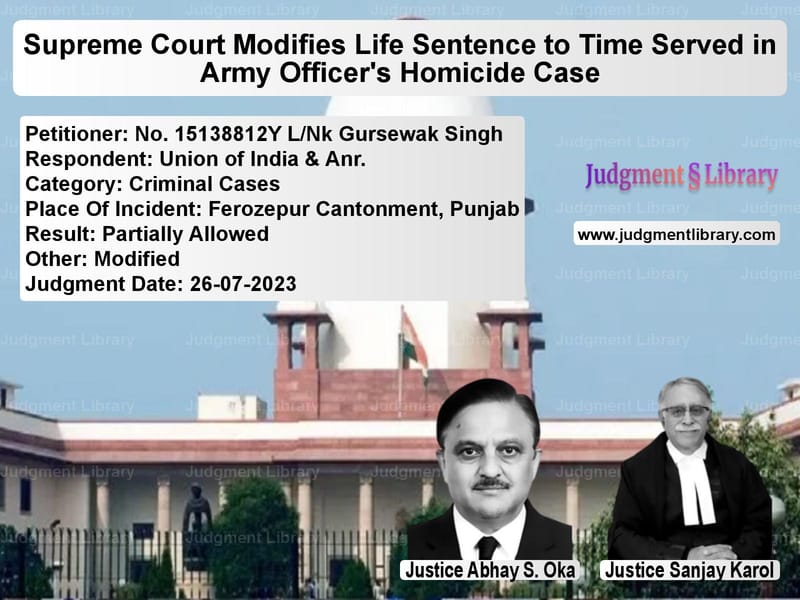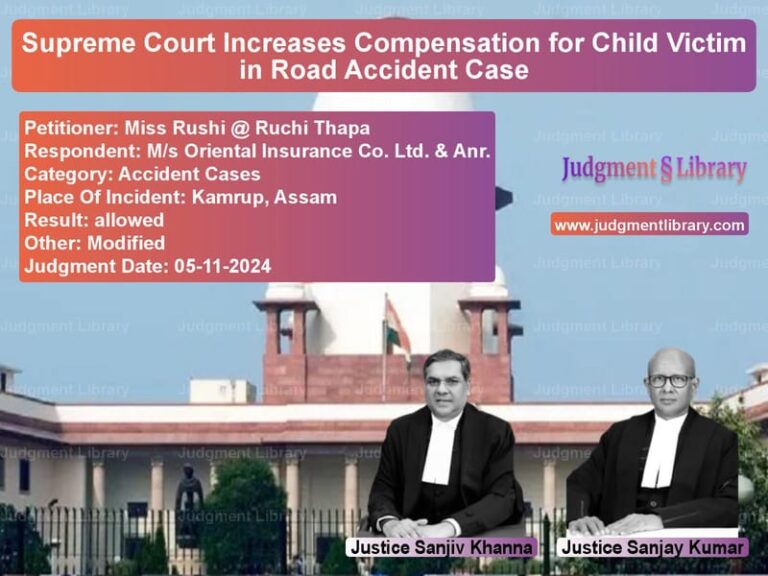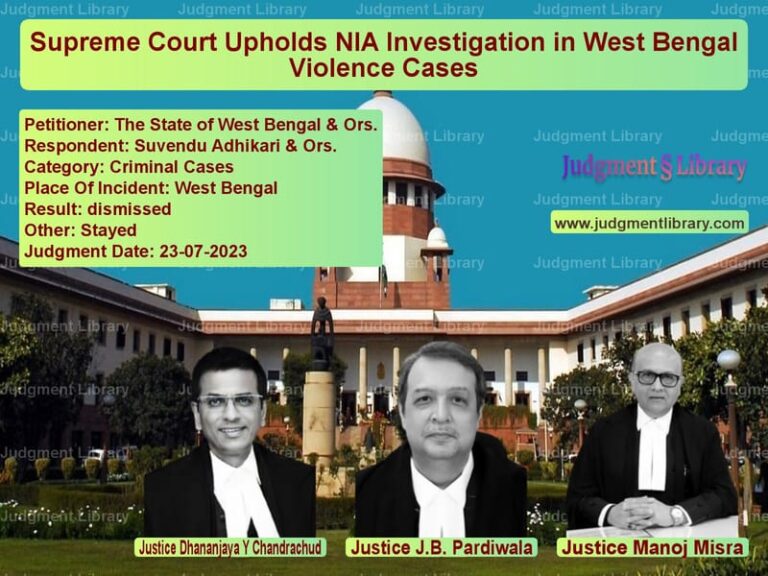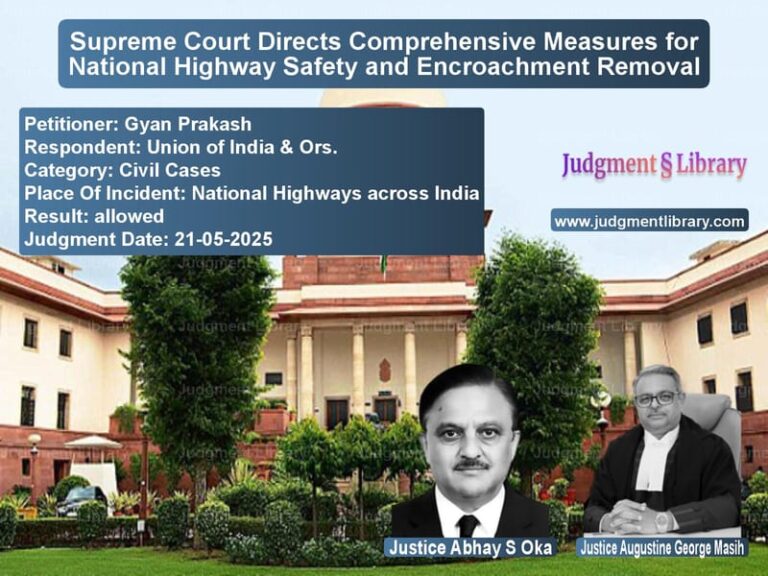Supreme Court Modifies Life Sentence to Time Served in Army Officer’s Homicide Case
The Supreme Court in No. 15138812Y L/Nk Gursewak Singh vs. Union of India & Anr. modified the conviction of an army officer from murder under Section 302 IPC to culpable homicide not amounting to murder under Section 304 Part I IPC. The Court reduced the sentence to the period already undergone, emphasizing the lack of premeditation and the mitigating factors surrounding the incident.
Background of the Case
The appellant, Lance Naik Gursewak Singh, was convicted by a General Court Martial (GCM) for the murder of Lance Naik Kala Singh while on duty at Ferozepur Cantonment on December 4, 2004. He was sentenced to life imprisonment and dismissed from service under Section 302 IPC read with Section 69 of the Army Act, 1950.
Subsequently, his pre-confirmation and additional pre-confirmation petitions were rejected by the Major General Officer Commanding on September 28, 2005. His petition to the Chief of the Army Staff was dismissed on June 12, 2006. He later filed a writ petition before the Punjab and Haryana High Court, which transferred the case to the Armed Forces Tribunal, Chandigarh. The Tribunal confirmed his conviction and sentence. His subsequent writ petition in the High Court was dismissed on October 10, 2018, but he was granted liberty to appeal under Section 30 of the Armed Forces Tribunal Act, 2007.
Sequence of Events Leading to the Incident
- On December 4, 2004, the appellant and deceased were posted on duty with the 13 Field Regiment.
- The deceased, Lance Naik Kala Singh, allegedly brought a bottle of country liquor.
- The appellant, the deceased, and the Guard Commander Naik Amrik Singh (PW-13) consumed liquor together.
- A dispute arose between the appellant and the deceased over seniority.
- After an initial altercation, the deceased replaced another guard for sentry duty outside the guard room.
- The appellant followed him outside, and another argument ensued.
- The appellant snatched the deceased’s rifle and fired one shot, which proved fatal.
Arguments by the Appellant
The appellant’s counsel contended:
- The case fell under Exception 4 to Section 300 IPC since it was an unplanned altercation.
- The appellant acted in a heat of passion without premeditation.
- Only one bullet was fired despite having more rounds in the rifle.
- The appellant attempted to help the deceased by taking him to the hospital.
- He had already undergone nine years and three months of incarceration, which should be considered a sufficient sentence.
Arguments by the Respondents
- The respondents argued that Exception 4 to Section 300 IPC did not apply.
- The appellant’s conduct should be judged in the context of being a member of a disciplined force.
- The act was committed while on official guard duty.
- The appellant acted in a cruel manner, showing disregard for discipline.
Supreme Court’s Observations and Judgment
The Supreme Court, comprising Justices Abhay S. Oka and Sanjay Karol, ruled in favor of modifying the conviction.
1. Application of Exception 4 to Section 300 IPC
“The facts indicate that there was no premeditation. The act was committed in a sudden fight over seniority when both individuals had consumed liquor. The incident falls within Exception 4 to Section 300 IPC.”
2. The Appellant Did Not Act with Premeditation
“If the appellant had any intent to kill, he would have fired multiple rounds. He fired only one shot, which indicates a lack of premeditation.”
3. Conduct After the Incident Was a Mitigating Factor
“The appellant did not attempt to flee. Instead, he helped in taking the deceased to the hospital. This conduct is inconsistent with an intention to murder.”
4. Modification of Conviction and Sentence
“Considering all mitigating factors, the conviction is modified from Section 302 IPC to Section 304 Part I IPC. The sentence is reduced to the period already undergone.”
Final Judgment
- The conviction was altered from murder (Section 302 IPC) to culpable homicide not amounting to murder (Section 304 Part I IPC).
- The appellant was sentenced to time already served (nine years and three months).
- The appellant, who was on bail since April 8, 2020, was not required to return to custody.
- His bail bonds were canceled.
Implications of the Judgment
- Recognizes situational factors in sentencing, particularly in cases involving sudden fights.
- Highlights the importance of mitigating circumstances in modifying convictions.
- Emphasizes that a single shot fired in heat of passion does not necessarily amount to murder.
- Sets a precedent for assessing intent and proportional punishment in homicide cases.
The ruling underscores the judiciary’s responsibility to balance justice with fairness, ensuring that punishment is proportionate to the circumstances of the offense.
Petitioner Name: No. 15138812Y L/Nk Gursewak Singh.Respondent Name: Union of India & Anr..Judgment By: Justice Abhay S. Oka, Justice Sanjay Karol.Place Of Incident: Ferozepur Cantonment, Punjab.Judgment Date: 26-07-2023.
Don’t miss out on the full details! Download the complete judgment in PDF format below and gain valuable insights instantly!
Download Judgment: no.-15138812y-lnk-g-vs-union-of-india-&-anr-supreme-court-of-india-judgment-dated-26-07-2023.pdf
Directly Download Judgment: Directly download this Judgment
See all petitions in Murder Cases
See all petitions in Bail and Anticipatory Bail
See all petitions in Criminal Defamation
See all petitions in Judgment by Abhay S. Oka
See all petitions in Judgment by Sanjay Karol
See all petitions in partially allowed
See all petitions in Modified
See all petitions in supreme court of India judgments July 2023
See all petitions in 2023 judgments
See all posts in Criminal Cases Category
See all allowed petitions in Criminal Cases Category
See all Dismissed petitions in Criminal Cases Category
See all partially allowed petitions in Criminal Cases Category







